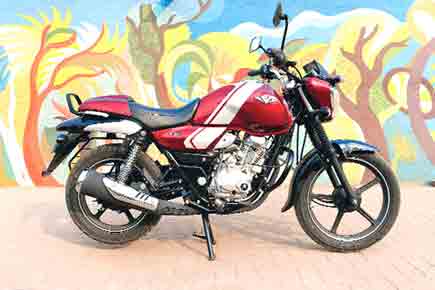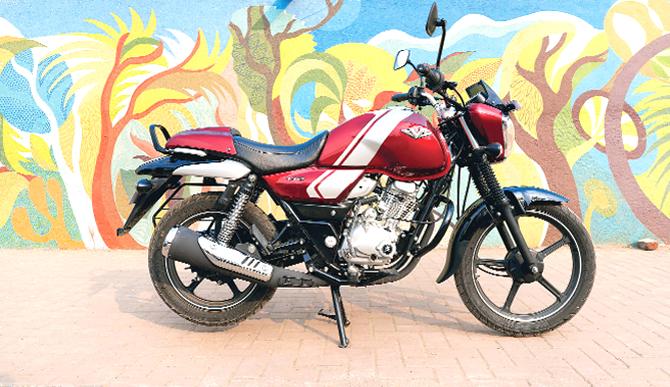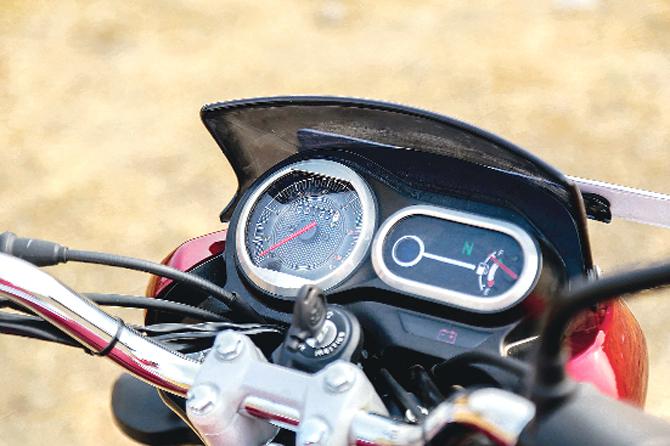The latest entrant in the 125-cc segment is the younger sibling of the popular Bajaj V15. And this one also boasts of INS Vikrant in it


Bajaj V15. Pic/Aditya Dhiwar and Saurabh Botre
ADVERTISEMENT
When we first heard that Bajaj was making bikes out of metal sourced from the INS Vikrant aircraft carrier in the V15, we were suitably impressed. You have to admit that as far as marketing campaigns go, this is right up there with Bajaj’s better ones like the original “I Feel Like God” campaign for the very first Avenger, and the “Fastest Indian” campaign for the Pulsar 220F.
However, we decided that we couldn’t let patriotism hamper our objective when reviewing the V12. We looked everywhere but at the shiny badge on the filler cap stating, “made with the invincible metal of INS Vikrant”. We decided to ignore the source of the metal and look at the bike as a whole. It definitely catches the eye, especially in this red with white pinstripes. You will also notice that the V12 has a lot of visual underpinnings from its 150-cc brother; the chassis, tank, headlamp unit, and tail-lamp unit.
 Headlamp brings less shine than the 50-watt unit on the V15. Pic/Aditya Dhiwar and Saurabh Botre
Headlamp brings less shine than the 50-watt unit on the V15. Pic/Aditya Dhiwar and Saurabh Botre
Look closely, and you will notice a few subtle differences. The rear tyres are thinner — still beefy for a 125-cc segment — and little bits of aluminium have been replaced with blacked-out metal instead. The fuel-tank is still the same 13-litre, the rear seat cowl and the overall retro styling has been left unblemished, which is good because it works well to give the V12 (and V15) some serious presence. So while a few elements have been tweaked to save cost, visually, the V12 is as good-looking as its elder brother, and looks absolutely nothing like any other 125-cc bikes out there. However, the black grab-rail was an eyesore on an otherwise delightfully styled motorcycle.
 The grab handle is the only sore spot. Pic/Aditya Dhiwar and Saurabh Botre
The grab handle is the only sore spot. Pic/Aditya Dhiwar and Saurabh Botre
It is also a little bit more torquey than its competitors with the 124.45-cc single-cylinder power mill producing an impressive 10.7 PS at 7,500 rpm and 11 Nm at 5,500 revs. The V12 is also heavier than a lot of its competitors with a 133-kg kerb weight figure. The seat is a little low on cushioning, but makes up for it with that additional sliver of support from the cowl. Another difference you notice from the V15 is that the dials are all analogue, rather than the analogue-meets-digital setup on the V15. We like that on a retro-looking bike.
 The analogue console has a whiff of the old-school. Pic/Aditya Dhiwar and Saurabh Botre
The analogue console has a whiff of the old-school. Pic/Aditya Dhiwar and Saurabh Botre
The engine fires up at the push of the starter, and sounds a little naughty for a 125-cc bike. The 125-cc engine isn’t sourced from the Discover 125; it is a de-bored version of the 149.5-cc engine seen on the V15.
We had issues with the brakes. They were underwhelming when compared to the rest of the bike, lacking in both progression and bite. The lack of disc brakes, even as an option, was a little disappointing.
While Bajaj hasn’t quoted an official fuel efficiency figure, one of their representatives has claimed an approximate figure of 55-odd km/l. However, you will have to wait for our road test before we can tell you for sure.
At Rs 68,600 on-road, Pune, the V12 is in the same price bracket as that of competitors’ disc-brake equipped 125-cc models; although the bike’s standout aesthetics and distinctively-sourced metal do justify that premium to a great extent.
 Subscribe today by clicking the link and stay updated with the latest news!" Click here!
Subscribe today by clicking the link and stay updated with the latest news!" Click here!







